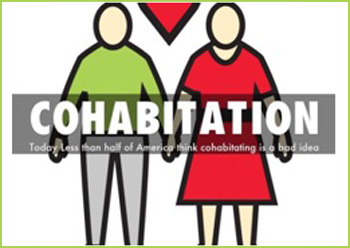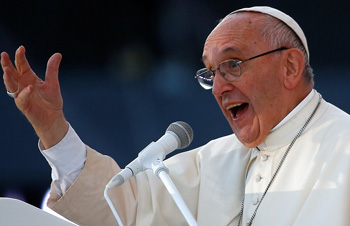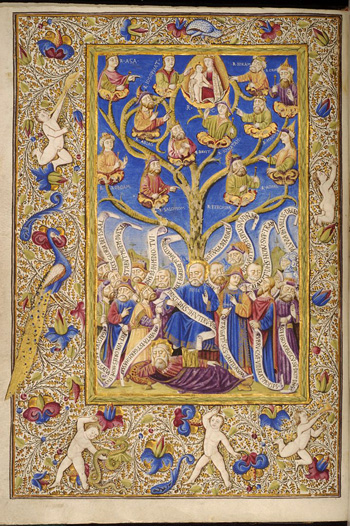Morals
 |
 |
 |
 |
 |
 |
 |
The Plague of Cohabitation
I was reflecting on cohabitation at work one day and observed that many were living in this type of “lifestyle.” This situation has gotten worse among Catholic couples as well as among non-Catholics. The latest statistics from the
Pew Research Center from 2017 indicate that the number of U.S. adults cohabitating continues to rise, especially among those age 50 and older. Unfortunately, it is not a surprise; well, at least it should not be, since marriage rates have declined over this same period.
What is cohabitation?
"Cohabitation" is commonly referred to as "living together" without being married. It describes the relationship of a man and woman who are sexually active and share a household, although they are not married.
This has truly reached a level that I have never seen before; So many act as if this is “okay” and disregard the Church teaching on living together before marriage. The reasons for this situation has many causes: One that stands high on the list is lack of proper teaching from the local parish. To be fair, this is not the case in ALL parishes. There are many good priests and marriage preparation courses.
 The Church is particularly concerned about cohabitation because the practice is so common today. This is true, above all, because – even though society may approve this practice – cohabitation simply cannot be squared with God's plan for marriage. This may be why most couples, who live together before marriage, find married life difficult to sustain for very long.
The Church is particularly concerned about cohabitation because the practice is so common today. This is true, above all, because – even though society may approve this practice – cohabitation simply cannot be squared with God's plan for marriage. This may be why most couples, who live together before marriage, find married life difficult to sustain for very long.
The Church does not invent laws. She passes on and interprets what God has revealed through the ages. No one in the Church has the right to change what Our Lord Jesus Christ has taught. If they were to do so, they would deprive people of knowing truths that were meant for all time.
Our Catholic Faith teaches us that a sexual relationship belongs only in marriage. Sex outside of marriage is forbidden by two Commandments of the Law of God, shows disrespect for the Sacrament of Matrinomy, the sacredness of sex and human dignity.
St. Paul said: “Know you not that the unjust shall not possess the kingdom of God? Do not err: neither fornicators, nor idolaters, nor adulterers.” (Corinthians 6:9) These words could not be any clearer for those who read them. Cohabitating is not in the plan of God. There are many reasons why Catholic couples should not cohabitate, and the most important is for the salvation of their souls. This is the perennial doctrine of the Church.
Pope Francis on Cohabitation
The apathy in which so many Catholics act towards this scourge is absolutely shocking. Many act as if nothing is wrong and even congratulate couples whot are in this type of relationship. It has gotten so bad that even Pope Francis has weighed in on this issue. In a Life Site article the Pope is quoted as saying that we should “welcome” cohabitating couples who “prefer to live together without getting married.”
 This advice contradicts almost two millennia of Catholic teaching. It also does not help the current moral crisis; it rather continues to break down the truth of our faith.
This advice contradicts almost two millennia of Catholic teaching. It also does not help the current moral crisis; it rather continues to break down the truth of our faith.
I witnessed a situation that is an example of the “diabolical disorientation” which plagues the Church. A few years ago I was invited to a “wedding,” that turned out not to be a wedding at all. I will give all the details.
There was a Catholic priest present and there was a liturgical presentation. The priest prayed over the couple but stopped before any vows could be spoken. As it would turn out, the woman who was to be “married” had in fact already been married in a Catholic Church to another man. The “groom” in this instance had been “civilly” married as well.
Two things struck me: Why a priest would even contemplate giving a blessing to the couple? Why did he allow the families and guests present at that gathering to have the illusion they were attending a real marriage?
Now to be clear, I do not blame any of those present as I am sure they were not taught correctly. As you can see, however, that ceremony was a disaster that impacted many souls who were witness to it.
What is the plan of God?
“In the beginning God created man to his own image: to the image of God he created him: male and female he created them.” (Gen 1:27)
From the beginning of Sacred Scripture, the creation of man and woman in the image and likeness of God is affirmed, and it concludes with a vision of "the wedding-feast of the Lamb" in the Apocalypse. Scripture speaks throughout of marriage and its "mystery," its institution and the meaning God has given it, its origin and its end, its various realizations throughout the history of salvation, the difficulties arising from sin, and its renewal "in the Lord" in the New Covenant of Christ and the Church.
Reasons for Marriage
The spouses' union achieves the threefold end of marriage: 1) the mutual support of the spouses; 2) the formation of the offspring, and 3) the remedy for concupiscence. These three meanings or reasons of marriage cannot be separated without altering the couple's spiritual life and compromising the goods of marriage and the future of the family. The conjugal love of man and woman thus stands under the threefold obligation of fidelity and fecundity. (Catechism of the Council of Trent, Part II, VIII, Marriage, §§ 13-14)
 Cohabitation almost invariably involves fornication, which is an intrinsic moral evil (ibid., Part III, VII, 6th Commandment, §§ 4, 7, 8, 9). This means that it is always and everywhere gravely immoral, compared to conjugal love which is meant to express the marital covenant between a husband and wife. As the Catechism of Trent points out, this love has an obligation owed by each spouse. The Sacrament of Marriage was restored by Our Lord Jesus Christ to be a mutual giving that is free, faithful and fruitful, (Ibid., Part II, VIII, Marriage, §§ 26, 27)
Cohabitation almost invariably involves fornication, which is an intrinsic moral evil (ibid., Part III, VII, 6th Commandment, §§ 4, 7, 8, 9). This means that it is always and everywhere gravely immoral, compared to conjugal love which is meant to express the marital covenant between a husband and wife. As the Catechism of Trent points out, this love has an obligation owed by each spouse. The Sacrament of Marriage was restored by Our Lord Jesus Christ to be a mutual giving that is free, faithful and fruitful, (Ibid., Part II, VIII, Marriage, §§ 26, 27)
Definition of Marriage
The nature and meaning of marriage are, therefore, to be first explained. Vice not infrequently assumes the semblance of virtue, and hence care must be taken that the faithful be not deceived by a false appearance of marriage, and thus stain their souls with turpitude and wicked lust. To explain this subject, let us begin with the meaning of the word itself.
Matrimony, according to the general opinion of theologians, is defined: The conjugal union of man and woman, contracted between two qualified persons, which obliges them to live together throughout life.
In order that the different parts of this definition may be better understood, it should be taught that, although a perfect marriage has all the following conditions, namely, internal consent, external compact expressed by words, the obligation and tie that arise from the contract, and the marriage debt by which it is consummated; yet the obligation and tie expressed by the word union alone have the force and nature of marriage.
The special character of this union is marked by the word conjugal. This word is added because other contracts, by which men and women bind themselves to help each other in consideration of money received or other reasons, differ essentially from matrimony.
Next follow the words between qualified persons; for persons excluded by law cannot contract marriage, and if they do their marriage is invalid. Persons – for instance, within the fourth degree of kindred, a boy before his fourteenth year, and a female before her twelfth, the ages established by law – cannot contract marriage. (Cf. ibid., § 3)
The words, which oblige them to live together throughout life, express the indissolubility of the tie which binds husband and wife.
The Three Blessings of Marriage
The following doctrine was also taken from the Catechism of the Council of Trent. (Part II, The Sacrament of Matrimony, §§23-25)
Offspring
 The first blessing, then, is a family, that is to say, children born of a true and lawful wife. So highly did the Apostle esteem this blessing that he says: “The woman shall be saved by bearing children.” (1 Timothy 2:15)
The first blessing, then, is a family, that is to say, children born of a true and lawful wife. So highly did the Apostle esteem this blessing that he says: “The woman shall be saved by bearing children.” (1 Timothy 2:15)
These words are to be understood not only of bearing children, but also of bringing them up and training them to the practice of piety; for the Apostle immediately subjoins: If she continue in faith. Scripture says: “Hast thou children? Instruct them and bow down their necks from childhood.” The same is taught by the Apostle; while Tobias, Job and other holy Patriarchs in Sacred Scripture furnish us with beautiful examples of such training. The duties of both parents and children will, however, be set forth in detail when we come to speak of the Fourth Commandment.
Fidelity
The second advantage of marriage is faith, not indeed that virtue which we receive in Baptism; but the fidelity which binds wife to husband and husband to wife in such a way that they mutually deliver to each other power over their bodies, promising at the same time never to violate the holy bond of Matrimony. This is easily inferred from the words pronounced by Adam when taking Eve as his wife, and which were afterwards confirmed by Christ Our Lord in the Gospel: “Wherefore a man shall leave father and mother and shall cleave to his wife and they shall be two in one flesh.”(Gen 2:24)
It is also inferred from the words of the Apostle: “The wife hath not power of her own body, but the husband: and in like manner, the husband hath not power of his own body but the wife.” (1 Cor 7:4) Justly, then, did the Lord in the Old Law ordain the most severe penalties against adulterers who violated this conjugal fidelity.
Matrimonial fidelity also demands that they love one another with a special, holy and pure love; not as adulterers love one another but as Christ loves His Church. This is the rule laid down by the Apostle when he says: “Husbands, love your wives as Christ also loved the church.” (Ephs 5:25) And surely Christ's love for His Church was immense; it was a love inspired not by His own advantage, but only by the advantage of His spouse.
Sacrament
The third advantage is called the Sacrament, that is to say, the indissoluble bond of marriage. As the Apostle has it: “The Lord commanded that the wife depart not from the husband, and if she depart that she remain unmarried or be reconciled to her husband; and let not the husband put away his wife.” (1 Cor 7:10) And truly, if marriage as a Sacrament represents the union of Christ with His Church, it also necessarily follows that just as Christ never separates Himself from His Church, so in like manner the wife can never be separated from her husband in so far as regards the marriage tie.
Conclusion
There is no other way to understand the clear teaching of Holy Mother Church. The Church, Saints and Doctors have clearly taught that cohabitation of a woman and man constitutes a sinful relationship that jeopardizes their souls and is an affront to Almighty God.
“The love of a husband and wife is the force that welds society together.” - St. John Chrysostom

What is cohabitation?
"Cohabitation" is commonly referred to as "living together" without being married. It describes the relationship of a man and woman who are sexually active and share a household, although they are not married.
This has truly reached a level that I have never seen before; So many act as if this is “okay” and disregard the Church teaching on living together before marriage. The reasons for this situation has many causes: One that stands high on the list is lack of proper teaching from the local parish. To be fair, this is not the case in ALL parishes. There are many good priests and marriage preparation courses.

The Church does not invent laws. She passes on and interprets what God has revealed through the ages. No one in the Church has the right to change what Our Lord Jesus Christ has taught. If they were to do so, they would deprive people of knowing truths that were meant for all time.
Our Catholic Faith teaches us that a sexual relationship belongs only in marriage. Sex outside of marriage is forbidden by two Commandments of the Law of God, shows disrespect for the Sacrament of Matrinomy, the sacredness of sex and human dignity.
St. Paul said: “Know you not that the unjust shall not possess the kingdom of God? Do not err: neither fornicators, nor idolaters, nor adulterers.” (Corinthians 6:9) These words could not be any clearer for those who read them. Cohabitating is not in the plan of God. There are many reasons why Catholic couples should not cohabitate, and the most important is for the salvation of their souls. This is the perennial doctrine of the Church.
Pope Francis on Cohabitation
The apathy in which so many Catholics act towards this scourge is absolutely shocking. Many act as if nothing is wrong and even congratulate couples whot are in this type of relationship. It has gotten so bad that even Pope Francis has weighed in on this issue. In a Life Site article the Pope is quoted as saying that we should “welcome” cohabitating couples who “prefer to live together without getting married.”

Francis: ‘We should welcome who prefer to live together without getting married’
I witnessed a situation that is an example of the “diabolical disorientation” which plagues the Church. A few years ago I was invited to a “wedding,” that turned out not to be a wedding at all. I will give all the details.
There was a Catholic priest present and there was a liturgical presentation. The priest prayed over the couple but stopped before any vows could be spoken. As it would turn out, the woman who was to be “married” had in fact already been married in a Catholic Church to another man. The “groom” in this instance had been “civilly” married as well.
Two things struck me: Why a priest would even contemplate giving a blessing to the couple? Why did he allow the families and guests present at that gathering to have the illusion they were attending a real marriage?
Now to be clear, I do not blame any of those present as I am sure they were not taught correctly. As you can see, however, that ceremony was a disaster that impacted many souls who were witness to it.
What is the plan of God?
“In the beginning God created man to his own image: to the image of God he created him: male and female he created them.” (Gen 1:27)
From the beginning of Sacred Scripture, the creation of man and woman in the image and likeness of God is affirmed, and it concludes with a vision of "the wedding-feast of the Lamb" in the Apocalypse. Scripture speaks throughout of marriage and its "mystery," its institution and the meaning God has given it, its origin and its end, its various realizations throughout the history of salvation, the difficulties arising from sin, and its renewal "in the Lord" in the New Covenant of Christ and the Church.
Reasons for Marriage
The spouses' union achieves the threefold end of marriage: 1) the mutual support of the spouses; 2) the formation of the offspring, and 3) the remedy for concupiscence. These three meanings or reasons of marriage cannot be separated without altering the couple's spiritual life and compromising the goods of marriage and the future of the family. The conjugal love of man and woman thus stands under the threefold obligation of fidelity and fecundity. (Catechism of the Council of Trent, Part II, VIII, Marriage, §§ 13-14)

A medieval marriage
Definition of Marriage
The nature and meaning of marriage are, therefore, to be first explained. Vice not infrequently assumes the semblance of virtue, and hence care must be taken that the faithful be not deceived by a false appearance of marriage, and thus stain their souls with turpitude and wicked lust. To explain this subject, let us begin with the meaning of the word itself.
Matrimony, according to the general opinion of theologians, is defined: The conjugal union of man and woman, contracted between two qualified persons, which obliges them to live together throughout life.
In order that the different parts of this definition may be better understood, it should be taught that, although a perfect marriage has all the following conditions, namely, internal consent, external compact expressed by words, the obligation and tie that arise from the contract, and the marriage debt by which it is consummated; yet the obligation and tie expressed by the word union alone have the force and nature of marriage.
The special character of this union is marked by the word conjugal. This word is added because other contracts, by which men and women bind themselves to help each other in consideration of money received or other reasons, differ essentially from matrimony.
Next follow the words between qualified persons; for persons excluded by law cannot contract marriage, and if they do their marriage is invalid. Persons – for instance, within the fourth degree of kindred, a boy before his fourteenth year, and a female before her twelfth, the ages established by law – cannot contract marriage. (Cf. ibid., § 3)
The words, which oblige them to live together throughout life, express the indissolubility of the tie which binds husband and wife.
The Three Blessings of Marriage
The following doctrine was also taken from the Catechism of the Council of Trent. (Part II, The Sacrament of Matrimony, §§23-25)
Offspring

It is through marriage that families
have continuity and play a role in History
These words are to be understood not only of bearing children, but also of bringing them up and training them to the practice of piety; for the Apostle immediately subjoins: If she continue in faith. Scripture says: “Hast thou children? Instruct them and bow down their necks from childhood.” The same is taught by the Apostle; while Tobias, Job and other holy Patriarchs in Sacred Scripture furnish us with beautiful examples of such training. The duties of both parents and children will, however, be set forth in detail when we come to speak of the Fourth Commandment.
Fidelity
The second advantage of marriage is faith, not indeed that virtue which we receive in Baptism; but the fidelity which binds wife to husband and husband to wife in such a way that they mutually deliver to each other power over their bodies, promising at the same time never to violate the holy bond of Matrimony. This is easily inferred from the words pronounced by Adam when taking Eve as his wife, and which were afterwards confirmed by Christ Our Lord in the Gospel: “Wherefore a man shall leave father and mother and shall cleave to his wife and they shall be two in one flesh.”(Gen 2:24)
It is also inferred from the words of the Apostle: “The wife hath not power of her own body, but the husband: and in like manner, the husband hath not power of his own body but the wife.” (1 Cor 7:4) Justly, then, did the Lord in the Old Law ordain the most severe penalties against adulterers who violated this conjugal fidelity.
Matrimonial fidelity also demands that they love one another with a special, holy and pure love; not as adulterers love one another but as Christ loves His Church. This is the rule laid down by the Apostle when he says: “Husbands, love your wives as Christ also loved the church.” (Ephs 5:25) And surely Christ's love for His Church was immense; it was a love inspired not by His own advantage, but only by the advantage of His spouse.
Sacrament
The third advantage is called the Sacrament, that is to say, the indissoluble bond of marriage. As the Apostle has it: “The Lord commanded that the wife depart not from the husband, and if she depart that she remain unmarried or be reconciled to her husband; and let not the husband put away his wife.” (1 Cor 7:10) And truly, if marriage as a Sacrament represents the union of Christ with His Church, it also necessarily follows that just as Christ never separates Himself from His Church, so in like manner the wife can never be separated from her husband in so far as regards the marriage tie.
Conclusion
There is no other way to understand the clear teaching of Holy Mother Church. The Church, Saints and Doctors have clearly taught that cohabitation of a woman and man constitutes a sinful relationship that jeopardizes their souls and is an affront to Almighty God.
“The love of a husband and wife is the force that welds society together.” - St. John Chrysostom

Posted October 2, 2019
______________________
______________________





